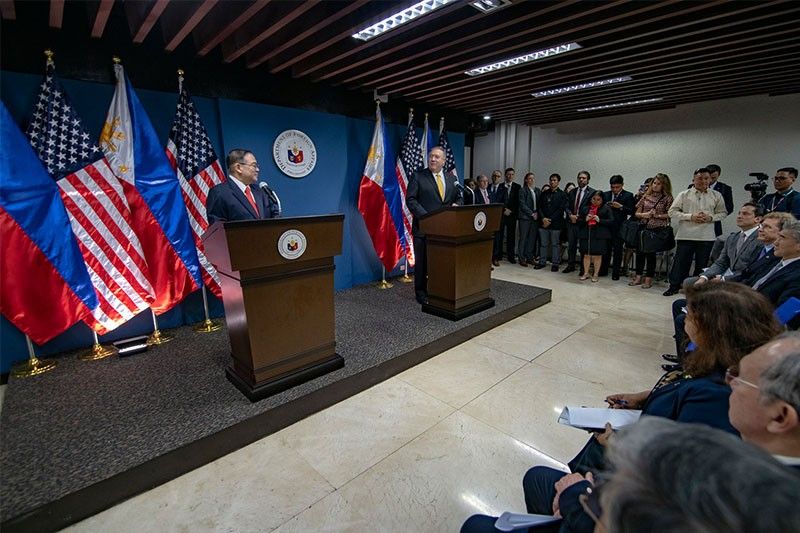Locsin, Pompeo discuss US policy shift in South China Sea

MANILA, Philippines — The top diplomats of the Philippines and the United States discussed Washington's latest policy declaration on maritime disputes in the South China Sea.
The US Department of State said Foreign Affairs Secretary Teodoro Locsin Jr. and US Secretary of State Mike Pompeo talked about the recent change in US policy in a call.
The two foreign ministers also discussed "US support for Southeast Asian coastal states upholding their sovereign rights and interests consistent with international law, and opprtunities for further US-Philippine maritime cooperation."
"The two secretaries also discussed the strong economic, security, and people-to-people ties that bind our two countries," the US Department of State said in a readout.
Pompeo, in a tweet, described his conversation with Locsin as a "good call" as they talked about shared interests in the South China Sea.
The US top diplomat said the alliance between the two countries is vital to a free and open Indo-Pacific.
Last month, Pompeo declared Washington's policy shift in the South China Sea, expressing support for Southeast Asian nations.
Challenging China's excessive claims in the South China Sea, Pompeo said Beijing's claims in the area are "completely unlawful."
"The world will not allow Beijing to treat the South China Sea as its maritime empire," Pompeo said.
The latest US policy affirmed the Philippines' July 2016 arbitral award, which invalidated China's mythical nine-dash line claim over the South China Sea, including the West Philippine Sea.
Beijing, on the other hand, rejected Washington's "exaggeration" of the situation in the South China Sea, accusing Pompeo of "distorting" facts and international law.
"Under the pretext of preserving stability, it is flexing muscles, stirring up tension and inciting confrontation in the region. Under the pretext of endorsing rules, it is using UNCLOS to attack China while refusing to ratify the Convention itself," the Chinese Embassy in the US said in a statement.
Following these developments, President Rodrigo Duterte has ordered the Philippine Navy not to participate in joint naval exercises with other countries in the South China Sea.
Naval powers, such as the US, Australia, the United Kingdom, France, India and Japan, have been holding joint maritime drills in the contested waterway.
Earlier this week, Defense Secretary Delfin Lorenzana revealed that Duterte gave the directive not to join maritime exercises in the South China Sea to avoid raising tensions.
"President Rodrigo Duterte has a standing order to us, to me, that we should not involve ourselves in naval exercises in the South China Sea except our national waters, the 12 mile distance from our shores," Lorenzana said.
A thread of major developments in the bilateral relations between the Philippines and the United States from April to December 2020. (Photo by AFP/Mark Cristino)
US national security adviser Robert O'Brien affirms Washington's commitment to the Philippines in protecting its sovereign rights, offshore resources and rights consistent with international law.
Citing Washington's realignment of its position on the South China Sea with the 2016 arbitral ruling that invalidate Beijing's expansive claims, O'Brien stresses that resources in the area belong to the Filipino people.
"They don’t belong to some other country that just because might, they may be big, and they may be bigger than the Philippines, they can come take away and convert the resources of the Philippine people," O'Brien says.
The US Embassy in the Philippines says the US government has turned over 150 laptop computers, printers, projectors and 80 sets of learning materials to the Department of Education through the United States Agency for International Development.
"This assistance is part of USAID’s Opportunity 2.0, a five-year, P1.9-billion ($37.5 million) project that works with DepEd, the Technical Education and Skills Development Authority, and local governments to support their ongoing programs to provide relevant education, employability skills, and work experience to out-of-school youth," the US Embassy says in a statement.
The US government launches a new program to provide second-chance opportunities to at least 180,000 out-of-school youth in the Philippines.
Under the five-year "Opportunity 2.0" project, which is worth P1.9 billion, the USAID will partner with DepEd and TESDA to augment their ongoing programs that provide relevant education, employability skills and work experience.
"Through this new partnership, we can leverage a range of resources to maximize the potential of the Filipino youth, particularly those who are out-of-school or unemployed. With the right knowledge, attitudes, and skills, they will play a pivotal role in this great country’s growth and success over the long-term," US Ambassador Sung Kim says.
US Secretary of State Mike Pompeo called Foreign Affairs Secretary Teodoro Locsin Jr. to discuss the recent change in US policy on maritime claims in the South China Sea, the US Department of State says.
The two foreign ministers also discussed US support for Southeast Asian coastal states upholding their sovereign rights and interests consistent with international law, as well as opportunities for further maritime cooperation between the two countries.
"The two secretaries also discussed the strong economic, security, and people-to-people ties that bind our two countries," the statement read.
The US Army and Marine Corps service members, in partnership with the Philippine Air Force, Army and Coast Guard, deliver an additional P11.4 million ($236,000) worth of personal protective equipment and medical supplies to hospitals in 11 cities in the Philippines.
The latest donation brings the total assistance of the US government to the Philippines' efforts against COVID-19 to P989 million (more than $20 million).
"This latest delivery of U.S. government assistance for Filipino frontliners in the battle against COVID-19 is a testament to our ongoing commitment to help the Philippines defeat the pandemic," US Ambassador Sung Kim says.
- Latest
- Trending





































